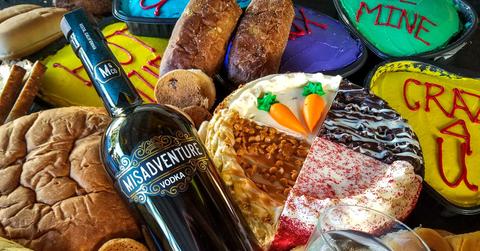New Distillery Turns Food Waste Into Vodka
A new distillery is turning almost-stale bread, bagels, and baked goods destined for the landfill into vodka, so your next cocktail will come with a side of eco-responsibility.
Updated May 25 2019, 5:35 a.m. ET
Want to drink responsibly? Good news: A new distillery is turning food waste into vodka, so you can have your cake and drink it, too. After discovering that the sugars in almost-stale bread, bagels, and cakes that would otherwise end up in the landfill could be distilled into vodka, Sam Chereskin and Whit Rigali founded Misadventure Vodka, which makes all its liquor from discarded starches. The southern California distillery collects up to 1,200 pounds of aging bakery products from the local food bank each week, fighting food waste while producing the liquor they now supply to bars, restaurants, and retailers throughout California.
"We wanted to use the excess food, remove it from the waste stream and make something that tastes good," Chereskin told NPR. And as Rigali added: "Once food is labeled as waste, there tends to be a bias about it. We want to change the perception."
Each bottle of Misadventure Vodka takes two pounds of food waste to produce, sourced from local food bank Jacobs and Cushman San Diego. The discarded baked goods that aren't suitable for the food bank's patrons are instead given to Misadventure.
"We get Twinkies, Ho Hos, French baguettes, crullers, you name it. The whole bakery aisle goes into our vodka," Rigali told Food & Wine. "Essentially, all these baked goods have starches and sugars inside them, which are the building blocks to making any type of alcohol."
Though the thought of drinking discarded food may sound unappetizing, the process of making Misadventure Vodka isn't that different from making any distilled liquor. The stale breads and baked goods are blended and mashed up, then pitched with yeast to ferment into alcohol. Distillation then extracts the alcohol and voila! Vodka.
Of course, there were some challenges to figuring out the process, and it took a year of intense development for the vodka to reach the shelf. Unlike other spirits, which are made with consistent ingredients, Chereskin and Rigali accept all starches, which means they get some unusual flavors like jalapeño bagels and chocolate cake. But as it turns out, that's not much of a problem.
"The vodka has a sweet note but, by a quirk of the process, yeast only eats the sugars, so the novel flavors are stripped out during the distillation. We can distill a consistent product even though we can never predict the ratios of the food waste we collect," Chereskin told NPR.
Not only does this process tackle the problem of what to do with the massive quantities of wasted food in the U.S. (an estimated 133 billion pounds of food is thrown away every year) it also stops the need for more virgin ingredients, essentially doubling the waste savings in one fell swoop. Plus, using old food lowers Misadventure's bottom line, allowing the founders to produce and sell their product at a lower cost, so you can help cut food waste, and cash waste, too.
